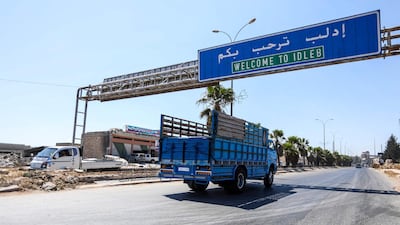The explosions have never really stopped in Idlib but now they have returned with renewed ferocity.
For more than a week, regime and Russian forces have attacked positions across the besieged Syrian province, which is home to about three million civilians. Russian fighter jets have been especially active. The Syrian Observatory for Human Rights estimated that they have conducted 50 air strikes in a single day. Schools, hospitals and homes have been destroyed.
The regime has not announced its military goals, but the positions and focus of the attacks have led to the suspicion that it wants to retake two pivotal highways that cross the province.
Doing so would shrink the territory occupied by Hayat Tahrir Al Sham and significantly deplete its revenue. Yet the loss of these central highways would actually be good news for the group, and bad news for Idlib's beleaguered residents. It would draw closer the millions of Syrian civilians trapped under the former Al Qaeda affiliate's rule, and make an already forgotten corner of Syria even easier to ignore.
From Aleppo, the main M5 highway runs south through Idlib province, towards Damascus. Midway through it splits, with one branch continuing to the capital and another, the M4, branching off towards Latakia and down the Mediterranean coast. Both roads are pivotal to the economic life of the country and their strangulation has had a disastrous effect on trade.
Since last week when air attacks restarted, aerial bombardment appears to be focused on the points where the M5 crosses from the Aleppo countryside into Idlib and where it exits. The main towns that bisect the two highways, Jisr Ash Shugur in the west of the province and Maarat Al Numan in the south, have been repeatedly struck, with the regime resorting to barrel bombs.
In fact, those areas have recently changed hands. In January, Hayat Tahrir Al Sham attacked towns along the M4 and M5, forcing the Turkish-backed Free Syrian Army to accept a ceasefire, and taking control of the routes. Now it appears the regime is determined to reclaim them.
As recently as two weeks ago, President Vladimir Putin was insisting the time was not ripe for a full-on assault on the militants who control Idlib province.
But the Assad regime, eager to begin making plans for post-conflict reconstruction and mindful of the propaganda value of bringing the majority of the populated regions of Syria back under its control, is itching for a resolution. At the start of April, it began limited shelling across the border between the territories it controls and Idlib.
It may be that regime and Russian attempts to retake the highways is a political compromise. For Moscow, an all-out assault is still too politically costly. For the regime, regaining control of them is essential to linking the country’s two largest cities.
However, doing so creates a captive and impoverished population for Hayat Tahrir Al Sham to rule. Millions are dependent on its administration as the de facto government in Idlib province. Losing the highways would slash the heavy bribes it collects to allow traffic through. Yet to a certain extent, that extortion also paid for the security of the province, which exists in a legal limbo, and until HTS managed to overcome other militant groups, was divided between rival extremist factions.
This is the awful dilemma the people of Idlib find themselves in. Anything that weakens the grip of Hayat Tahrir Al Sham without replacing it with another governing entity merely makes their lives harder and less secure.
The tragedy is that there is no good outcome for Idlib.
The Syrian regime wants the province back under its control. Given that many of those in Idlib were displaced from other parts of the country, or moved there under surrender deals with that same regime, such an outcome will almost guarantee retribution against them.
Turkey considers itself an alternative. However, creating an enclave of Syrian territory run by Ankara is a recipe for years of conflict with the rest of Syria, to say nothing of the complications under international law. Moreover, the nation appears to be focusing its resources on ensuring that the situation in the border region, where Syria's Kurds operate under the protection of US forces, is resolved to its liking. Although it was meant to guarantee the Idlib deal and evict militants from the region, in practice its attention has been elsewhere.
There are few alternatives. Europe, dealing with its own internal issues, only wants to ensure that there is no large-scale assault on the province so no more refugees cross its borders. Already carrying a heavy burden, Syria's neighbours do not wish to take in more displaced people. The people of Idlib are stuck.
The province is being forgotten in plain sight. Reconnecting Syria's two major cities would simply give the rest of the world even fewer reasons to think about it.



